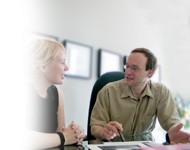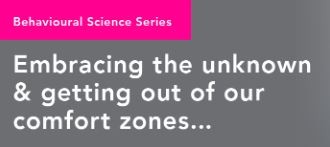“Seizing and freezing” and the perils of expertise when seeking creative behavioural solutions
7 September 2022“Seizing and freezing” and the perils of expertise when seeking creative behavioural solutions
When trying to solve a sticky behavioural problem I have, on occasion, found myself in meetings where the most senior attendees perform the verbal equivalent of Usain Bolt at the London Olympics. They seem to have a ready to go solution on the tips of their tongues, all whilst my own synapses are slowly untangling an optimum route from a host of possibilities.
In his book The Power of Ignorance, Dave Trott quotes an American ex-Diplomat who characterised this phenomenon best, with the line: “Most people approach every problem with an open mouth”. Indeed, the need to be first in offering up a solution appears to have become a contest in boardrooms nowadays, whilst the need to mull over or (heaven forbid!) express ignorance has become synonymous with weakness.
In the world of behaviour change, is this a red flag?
On the surface, senior people being able to generate ‘the best’ solutions doesn’t sound all that controversial. After all, the speed with which information can be retrieved from complex interrelated networks of information is what separates out experts from novices. Cleary then, expertise when tackling any problem can be incredibly useful.
In acquiring expertise however, it is easy to fall into the expert’s trap. Eric Dane from Rice University calls this entrenchment, whereby the more domain specific expertise one acquires, the more they risk losing their ability to creatively problem solve owing to the fact that the hard-fought accrual of knowledge subsequently gives rise to an inflexibility of thinking, with new information being ignored or shoehorned into places it shouldn’t be, often rapidly so.
Troublingly, quickly formed opinions have been shown to often be flawed. Take the below, which is from Jonah Sachs’ wonderful book, Unsafe Thinking:
“Imagine we make a wager. I will show you a partially blurred image, and you have to guess what it is. You know that about half the people who have seen this blurred image before you have identified it correctly. So it’s a fair bet. But now I add a wrinkle. You can choose between two ways of seeing the image. In the first option, we’ll start with the partially blurred image, and it will slowly dissolve into extreme blurriness. Then you’ll guess. Or you can choose the opposite. We’ll begin at extreme blur and slowly proceed to the partially blurred state. Which would you choose? And do you think it matters?”
The results, it turns out, are interesting…
Those who go from partial blurriness into extreme blurriness get it right 50% of the time whereas those who go from extreme blurriness into partial blurriness get it right only 25% of the time!
The results are due to a phenomenon known as “seizing and freezing”, which Sachs points out occurs when people’s need for closure results in them seizing on an early solution and freezing on it, even when faced with contradictory evidence that their decisions might not be working out.
This phenomenon tends to befall those who value certainty in their answers to questions and who are less comfortable with haziness and ambiguity, they just can’t help but lurch to a response. This may be problematic in the world of behaviour change where, as Rory Sutherland says, there are far more good ideas out there that we can post-rationalise than there are good ideas that we can pre-rationalise.
All is not lost…
So, if expertise can shackle us and the need for urgent closure can misguide us, what’s to do? Well, according to Sachs, in order to combat the inflexibility that can seep into our thinking, one antidote may be embracing the unknown and getting out of our comfort zones. By placing ourselves in the unfamiliar, our attachment to a single mode of processing new information is loosened and we’re forced to spend more time as explorers rather than experts and enhance our abilities to know a bit about many things.*
Something else I also like to do to deter this style of thinking, is to actively craft my project teams so that there is a diverse range of thinking onboard. That way, as long as a culture has been cultivated in which people feel able to speak up, you exponentially expand your team’s ability to think creatively.
In the behaviour change space then, clearly there is a place for expertise when trying to formulate novel user-focused ideas for interventions, but relying on it and it alone can be self-limiting.
Whilst this article sheds some light on why this is and what we can do to combat its influence, let me know what other tips and tricks you have come across to boost creativity in your own teams…
* Sachs’ point reminds me of a BBC documentary I watched many years ago about Andre Geim, a Professor at Manchester University who won the Nobel Prize in Physics for his 2010 discovery of Graphene (you can watch it here). What chimes with me here is Geim’s switching of fields that he has made a feature of his career and which has led to an originality of thinking many of his peers can only marvel at.













